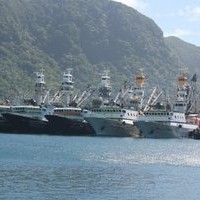
Later this month, the United States and Forum Fisheries Agency negotiators will sit down in Auckland, New Zealand for another round of talks for an agreement that would allow US purse seiners to fish within the Exclusive Economic Zones of island countries.
The talks are set for June 21 to the 24th and since the last discussions didn’t achieve much, there’s much expectation riding on the upcoming meeting.
The current agreement expires December 31st this year.
When last year’s treaty expired and purse seiners that had been fishing in the tuna treaty fishing grounds were left without permits some of the purse seiners which were supplying the canneries headed to the eastern Pacific area.
At least 12 locally based purse seiners made the move rather than sit idle in Pago Pago harbor running up dock charges and their crew now being able to earn money.
According to Brian Hallman of the American Tunaboat Association most of those vessels have come back to the Western Pacific since the US Pacific Tuna treaty impasse was resolved a few months ago.
He says 2 or 3 have stayed on in the Eastern Pacific .
Hallman says that fishing in the Western Pacific the preferred fishing grounds for purse seiners that supply the local canneries has been slower than usual.
And more than a year after a request was made to the National Marine Fisheries Service to exempt boats that deliver half of their catches to StarKist and Samoa Tuna Processors, from a US imposed ban on purse seine fishing in the high seas of the Western and Central Pacific area , the federal agency has still not granted the waiver.
Instead NMFS put into effect an interim rule which limits the number of fishing days for US purse seiners in the high seas area for this year to the same level as last year, which is 1,828 days.
According to the federal agency the interim rule is necessary for the United States to implement and international migratory fish stocks agreement that the US signed as a member of the Western and Central Pacific Fisheries Commission.
NMFS said it issued the interim rule without prior notice or request for comments because of the unexpectedly high level of U.S. purse seine fishing effort in the high seas area in 2016.
And this was an after effect of the impasse on the US Pacific Tuna Treaty.
When the purse seiners were left without licenses when the treaty expired without a new agreement in place, purse seiners resorted to fishing in the high seas area.
The replacement treaty was not reached until March.
The President of the American Tunaboat Association Brian Hallman says unless the USG makes an exemption for American Samoa based boats, everyone will be stuck with the current high seas limits.





